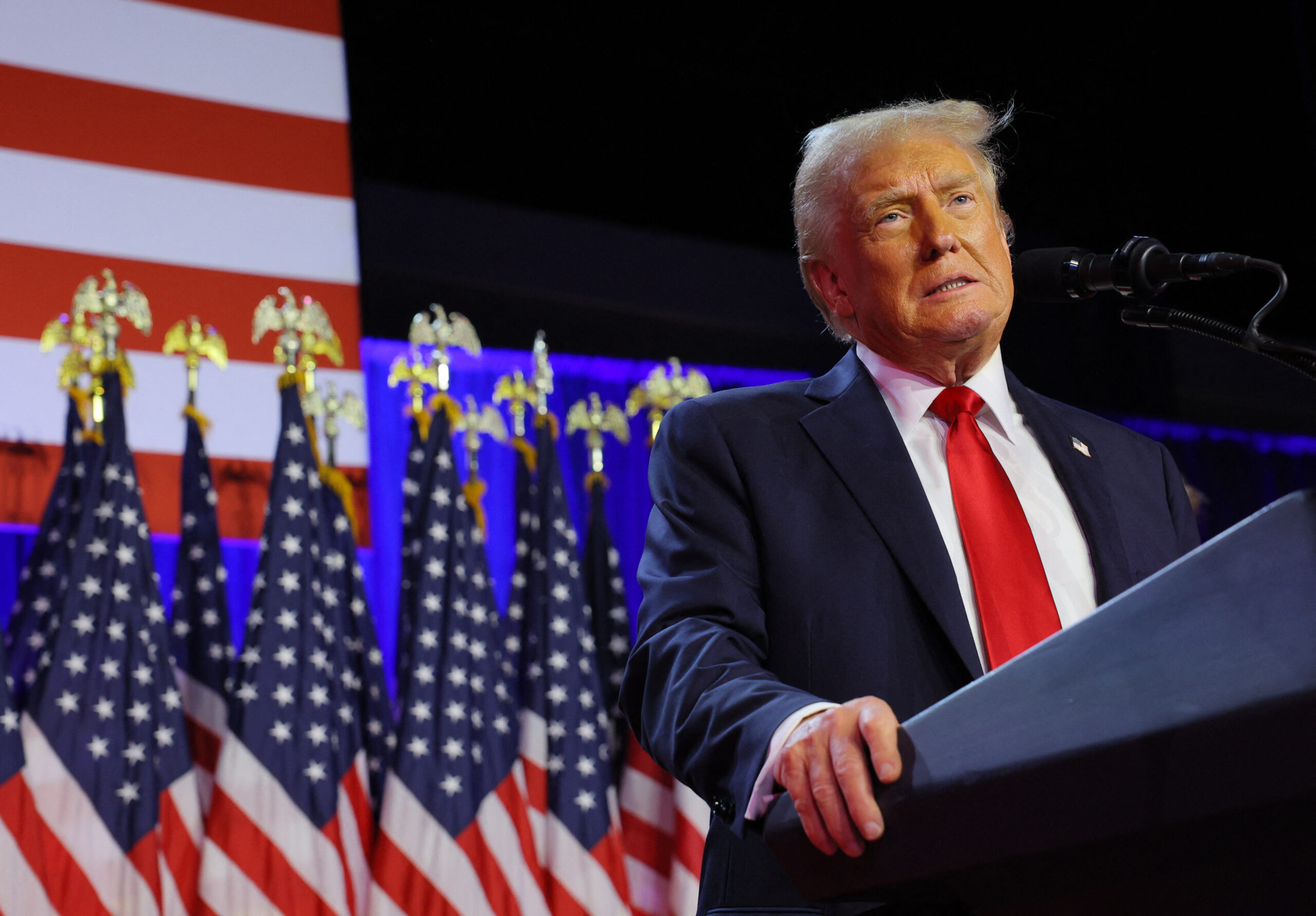As Donald Trump was projected to win the White House, according to Edison Research, the U.S. dollar and stock market are seen as winners. However, a Republican presidency could weigh on bonds, emerging markets, clean energy, and sustainable investing.
Here’s how:
CURRENCIES
A Trump presidency is seen strengthening the U.S. dollar, with investors expecting his policies to lead to higher inflation and growth than would have been the case under Democrat Kamala Harris. That will mean the Federal Reserve would need to keep rates high to prevent the economy from overheating, which in turn would be bullish for the dollar.
At the same time, Trump’s plans to impose tariffs on trade, force European allies to pay more for defense, and suspicion of multilateral institutions are likely to depress growth elsewhere in the world, boosting the dollar’s allure. Citi analysts expect the dollar to rally 3% after a Trump win.
Analysts expect a sharp fall in the euro, possibly below the key $1 level, if tariffs and domestic tax cuts follow.
They also expect China’s yuan to slide further, as in 2018-2020 when it depreciated swiftly.
Higher dollar yields will also mean a return of carry trades, with currencies such as the Japanese yen and Swiss franc already heavily sold in the run-up to the election.
Yet the Swiss franc will find support, analysts say, thanks to the country’s higher-value exports shielding it from tariffs and the currency’s tendency to outperform during periods of higher inflation.
With the Trump administration expected to take a softer line on cryptocurrency regulation, bitcoin is another potential winner. The world’s largest cryptocurrency rose to an all-time high on Wednesday.
STOCKS
Trump’s promise of less regulation and lower taxes for big corporations, more oil production, and tough immigration policy point to stronger growth and inflation, viewed as positive for equities. Sectors such as banks, technology, defense, and fossil fuels are likely to benefit.
His plan to cut the corporate tax rate to 15% from 21% would raise S&P 500 earnings by about 4%, Goldman Sachs estimates.
Even so, it is not yet clear how much of Trump’s tax cut plan will make it through Congress. At the same time, his protectionist policies and tough stance on China would raise costs, reduce profitability, and hurt multinational companies.
Outside the United States, a strong dollar, rising U.S. rates, and trade tensions will mean defensive sectors will do better and multinational companies with exposure to U.S. markets will take a hit.
Sectors exposed to tariff changes, such as semiconductors, autos, and clean energy, will likely be volatile. Investors front-running the election outcome have exited holdings of Japanese stocks, where automakers dominate, and European electric vehicle and chip stocks.
Barclays has warned of possible “high single-digit” percentage drops in European earnings should trade conflicts reignite. Europe’s defense sector is likely to have a mixed outcome after Trump said he will end the Ukraine war but has also said European allies need to spend more on defense.
BONDS
Investors have been growing increasingly alarmed about the scale of U.S. government debt and fiscal deficits adding to it, with worries that it will push up borrowing costs, or Treasury yields.
Trump’s spending plans could add $7.5 trillion to deficits over 10 years, according to one estimate, far greater than what Harris had proposed. Treasury yields rose almost 50 basis points in October when markets were pricing in a higher likelihood of a Trump win.
Inflationary pressures from Trump’s policies would leave the Fed with less room to cut rates, which will keep Treasury yields elevated.
A Trump win is also likely to suppress growth in Europe and Asia, as tariffs and other policies put pressure on those economies. More pressures on the euro, yen, Swiss franc, and other currencies, and higher inflation will reduce the room central banks there have to cut rates as needed. Analysts expect global yields to rise.
COMMODITIES
Trump will aim to maximize U.S. oil and gas drilling by expanding federal leasing and rolling back environmental regulation where possible – a policy agenda that all but guarantees the country will remain the world’s top petroleum producer. That robust supply could help keep U.S. West Texas Intermediate crude futures, which dropped around 4% so far this year, relatively low.
On the other hand, he’s likely to ramp up enforcement of oil sanctions on Iran, something that could trim a swath of world crude supply. He has also said he will fill up the Strategic Petroleum Reserve to levels never seen before, which could add support to prices as the government enters the markets.
Soybeans are also in the crosshairs. U.S. merchants had been racing to ship a record-large harvest ahead of the election amid fears of renewed trade tensions with China, the world’s biggest soy importer. China, which failed to fully comply with a 2020 agreement with the Trump administration to buy more U.S. agricultural goods, has purchased fewer U.S. soybeans this marketing year and almost no corn. Soybean prices are down 25% compared to a year ago.
EMERGING MARKETS
Even before the election, concerns over Trump’s policies had weighed on emerging economies. In addition to tariffs on China, Trump has said he would slap a tariff as high as 200% on Mexican vehicle imports. Mexico’s peso could weaken beyond 21 to the dollar, levels not seen in more than two years, analysts say.
Another potential headwind for emerging markets: Trump’s vice presidential candidate JD Vance has proposed a 10% tax on remittances, important for many Latin American economies.
South Africa’s rand, Brazil’s real and stock markets in these countries are vulnerable if there are tariff hikes, as are chipmakers in Taiwan, South Korea, and others that produce for Chinese tech firms.
A Treasuries sell-off and dollar rise will also suck money out of emerging markets and force tighter monetary policies in many countries.
Emerging economies with domestic growth and reform stories such as India or South Africa could benefit and become a haven in otherwise volatile global settings. Copper and lithium producer Chile could be largely spared because of the less-replaceable nature of its exports.
SUSTAINABLE INVESTING
A Trump win would allow him to follow through on his campaign promises to roll back green regulations curbing oil and gas drilling and coal mining, which could boost shares in those sectors.
Trump also has said he would “rescind all unspent funds” under the Inflation Reduction Act, the Biden-Harris administration’s signature climate law that includes hundreds of billions of dollars in subsidies for electric vehicles, solar and wind energy.
But steps that could actually drive down shares in those sectors may require congressional action and several Republican lawmakers have expressed support at least for parts of it.
Trump has also vowed to fire Gary Gensler as chair of the U.S. Securities and Exchange Commission. That would be a setback for U.S. sustainable funds’ ability to press companies for policy changes and potentially make those funds less appealing. The funds have faced net withdrawals since 2022 as high energy prices hurt relative returns.
(Source: Reuters)













